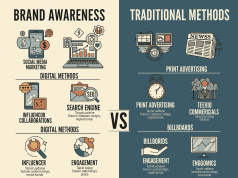In today’s digital landscape, artificial intelligence (AI) is dramatically reshaping the advertising technology (AdTech) industry. With its ability to analyze massive datasets, predict consumer behavior, and optimize ad placements in real time, AI is setting new standards for effectiveness in marketing. Here are some of the key trends that are driving this transformation.
1. Enhanced Data Analysis and Insights
AI systems can process vast amounts of data at unprecedented speeds. This capability allows marketers to extract actionable insights from consumer behavior patterns, demographics, and preferences. Tools powered by machine learning algorithms can identify trends and anomalies that human analysts might overlook.
Example:
By leveraging predictive analytics, brands can forecast consumer trends, enabling them to tailor their marketing strategies to meet specific demands—resulting in higher engagement and conversion rates.
2. Personalization at Scale
Consumers today expect personalized experiences, and AI makes this possible on a large scale. By analyzing user behavior and preferences, AI-driven platforms can deliver targeted ads tailored to individual needs and interests.
Benefits:
- Dynamic Ad Creation: AI can automatically generate personalized ad content, varying images, copy, and formats based on user data.
- Behavioral Retargeting: AI allows for sophisticated retargeting strategies, ensuring the right message reaches the right consumer at the right time.
3. Programmatic Advertising Optimization
AI is transforming programmatic advertising, automating the process of buying and selling ad space in real-time. This technology analyses multiple variables such as user behavior, time of day, and platform to optimize campaigns effectively.
Advantages:
- Cost Efficiency: Automated bidding ensures advertisers pay the best price for ad placements, maximizing budgets and ROI.
- Real-Time Adjustments: Campaigns can be tweaked on-the-fly based on performance metrics, ensuring optimal results throughout the ad lifecycle.
4. Improved Customer Journey Mapping
Understanding the customer journey is crucial for effective marketing. AI tools can help brands map out the customer journey by analyzing various touchpoints across different platforms and devices, providing a holistic view of consumer interactions.
Impact:
This insight allows marketers to identify bottlenecks and strengths in the customer journey, enabling more efficient funnel management and improved customer retention strategies.
5. Enhanced Fraud Detection
Ad fraud, including bot traffic and fake clicks, poses significant challenges for advertisers. AI can help combat this issue by identifying fraudulent patterns and behaviors, thereby protecting marketing budgets.
How It Works:
Machine learning algorithms can analyze historical data to detect anomalies in ad performance, signaling potential fraudulent activity. This proactive approach helps ensure that advertisers achieve genuine ROI.
6. Voice and Visual Search
With the rise of voice-activated devices and visual search technology, AI is becoming essential for adapting advertising strategies to new search trends. Voice search queries often differ from traditional text searches, requiring tailored keyword strategies.
Implications:
- Voice Search Optimization: Brands need to re-evaluate their SEO strategies to accommodate conversational tones and long-tail keyword phrases.
- Visual Recognition Technology: This technology allows advertisers to understand how consumers interact with visual content, refining targeting strategies based on image data.
7. Ethical Considerations and Transparency
As AI continues to grow in AdTech, ethical considerations regarding data privacy and transparency are gaining importance. Advertisers are increasingly called to prioritize consumer trust, ensuring responsible data usage.
Actions to Consider:
- Implementing transparent data usage policies.
- Providing consumers with clear options regarding ad personalization and data tracking.
Conclusion
AI is not just a buzzword; it’s a powerful disruptor that is redefining the AdTech landscape. By enhancing data analysis, enabling personalization, optimizing programmatic advertising, mapping customer journeys, improving fraud detection, adapting to new search modalities, and addressing ethical considerations, AI is unlocking new opportunities for brands to connect with consumers more effectively than ever before.
Staying abreast of these trends is crucial for marketers aiming to navigate the evolving digital ecosystem and achieve success in their advertising endeavors. Embracing AI is no longer optional; it’s an imperative for those who wish to remain competitive in the rapidly changing world of AdTech.









